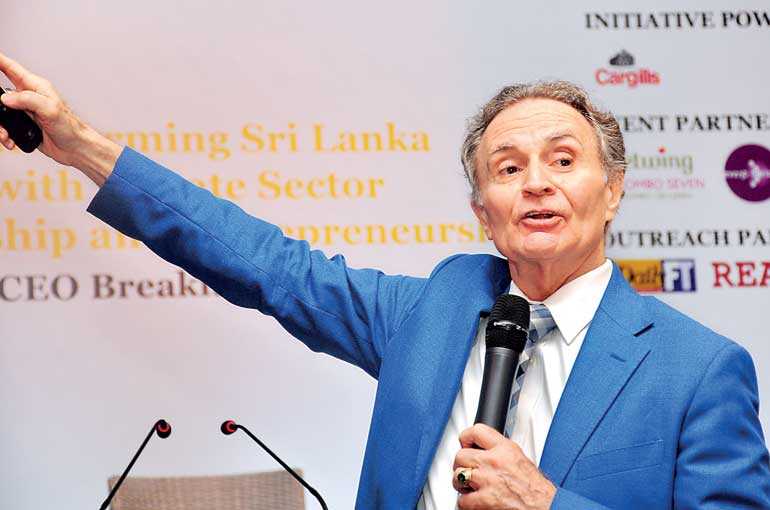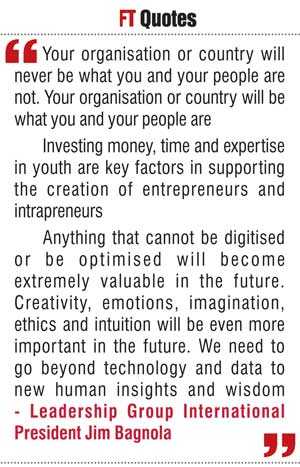Tuesday Feb 24, 2026
Tuesday Feb 24, 2026
Monday, 21 May 2018 00:10 - - {{hitsCtrl.values.hits}}

By Charumini de Silva
Sri Lanka’s first integrated entrepreneurship platform, Venture Frontier Lanka, in association with the Daily FT and Ovibees Ventures, recently held a CEO’s Breakfast Forum on ‘Transforming Sri Lanka with private sector leadership and entrepreneurship’.
The event, held at Jetwing Seven and powered by Cargills Ceylon Plc, brought together leaders of the top companies in the country for thought-provoking session.
Leadership Group International President Jim Bagnola, delivered the keynote address on the theme ‘Leadership is everybody’s business’. Bagnola coaches Fortune 100 global executives in leadership and management and is among the top 10 leadership experts globally. Bagnola provided the top CEOs in Sri Lanka with several globally time-tested leadership and management principles to create holistic business models.
Becoming a global country
Bagnola said the future skills of a leader were required now to transform individuals, organisations and countries. “Your organisation or country will be what you and your people are,” he pointed out.
He highlighted the importance of providing English language training for children to think and speak globally, while noting that Hindi and Mandarin would also have the potential to become the next global language.
Conscious capitalism with moral intelligence, where it is connected to social responsibilities and values, were also highlighted as key factors in doing business today.
In terms of increasing learning agility and ability, Bagnola stressed making continuous learning a habit and to practise science-based meditation to increase capacity and reduce stress.
Managing millennials
“Millennials want to work and buy companies that are value driven. The unfortunate or fortunate thing we are facing is that millennials are taking over. People in the ages between 18 and 30 are the millennials, and we have to pay attention to them because 71% of them want to be entrepreneurs,” he added.
Describing millennials as “job hoppers”, he said it was important to create an environment for them to act like entrepreneurs in the workplace, as 40% of workplaces now had millennials and in four to five years it would be 80%. Millennials also need to understand themselves because they’ll be managing each other in a few years,” he added. “Millennials want instant gratification. Thus, corporates have to create an enabling environment for them to succeed in a short time,” he stated. “Learn to look through the generational lenses and become technologically savvy and an expert in social networking,” Jim advised Lankan CEOs as millennials make up the majority of employees and will increase in numbers.” Key characteristics of millennials include ‘Focus me’, ‘Equip me’, ‘Know me’, ‘Help me see value’, ‘Care about me’, ‘Help me grow’, ‘Hear me’, ‘Help me see importance’, ‘Help me feel proud’, ‘Help me build mutual trust’, ‘Help me review my contributions’ and ‘Challenge me’.

Leading is management of energy
The importance of creating leaders at every level of organisation was stressed as well as the art of learning how to get people to follow you. For this, leaders and organisations need to create a culture that allows for influencing upward (feedback to the boss).
The challenge is to increase the leaders’ personal energy level and that of the team. “Leading is management of energy,” he added.
Enabling language
Disabling language
Jim shared some examples of leading from what he described as the “inside out”, which refers to an explanatory style, self-referral beliefs, experience and values.
This he articulated with the use of empowering language by a leader to a teammate and disempowering language.

Empowering language
Disempowering language
Getting employee engagement right
“In a world where everything is connected, everything is equally excellent, where performances are reaching perfection there is only one space to innovate in and that is you! If you create things, you discover yourself,” he added. According to him, an engaged employee is a follower whose characteristics include loyalty, psychologically commitment, greater productivity, more likely to stay at least one year and less likely to have accidents or steal on the job. He said a disengaged employee was a subordinate who was less productive, not committed and more likely to miss workdays and more likely to leave. He described a disengaged employee as an insubordinate who was physically present, yet psychologically absent, unhappy with their work situation and insisted on sharing that unhappiness with co-workers.
Citing a study conducted in 66 countries for 20 years on the results of employee engagement, Bagnola emphasised business units that scored high on the 12 elements consistently performed better than those that scored low.
On average the units scoring high on employee engagement show on average an 86% higher success rate on customer metrics, 70% higher success rate in lowering turnover, 70% higher success rate in productivity, 44% higher success rate in profitability and 78% higher success rate in safety figures.
Engaged employee: Follower
Not engaged: Subordinate
Actively disengaged: Insubordinate
Practice building alliances and partnerships
“Leadership is a partnership and success is a team sport,” he stressed.
He elaborated on the importance of learning about other cultures, honouring diversity, utilising the power of female creativity and intelligence.
Bagnola also urged the CEOs present in the audience to make health a priority individually as well as at the organisational level.
Investing money, time and expertise in youth were pointed out as key factors in supporting the creation of entrepreneurs and intrapreneurs. “Anything that cannot be digitised or be optimised will become extremely valuable in the future. Creativity, emotions, imagination, ethics and intuition will be even more important in the future. We need to go beyond technology and data to new human insights and wisdom,” he emphasised.
Pix by Lasantha Kumara
Related articles:
Private sector take on ‘Transforming Sri Lanka with entrepreneurship'